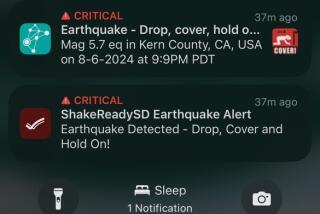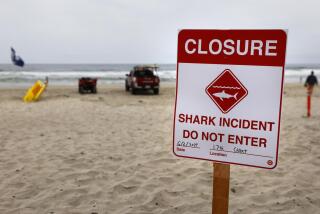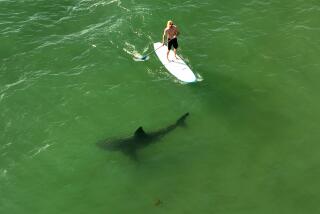Tweeting sharks warn of danger at Australia’s beaches
Packing for a trip to the beach in Western Australia? Be sure to include your smartphone, and don’t forget to check Twitter to see what the sharks are up to while you’re there.
Scientists have found a way, essentially, to have sharks let you know when they’re close to the beach. They’ve tagged 338 sharks with acoustic transmitters that trigger a computer alert when a shark comes within about a mile of a beach. The computer then generates a tweet on the Twitter account of Surf Life Saving in Western Australia (@SLSWA).
The tweets tell beachgoers what area the shark is in, how far away it is and its type and size. The shark monitoring is also valuable to researchers seeking to learn more about their movements.
Fisheries advise: tagged Tiger shark detected at 2km off Scarborough receiver at 09:41:00 PM on 2-Jan-2014— Surf Life Saving WA (@SLSWA) January 2, 2014
The Twitter alert system aimed at beachgoers is quicker than traditional warnings that go out on the radio and in newspapers, Chris Peck, operations/community safety manager at SLSWA, told Sky News.
“You might not have got some of that information until the following day in which case the hazard has long gone and the information might not be relevant,” Peck said.
But the tweets alone won’t necessarily keep you safe. Western Australia’s Department of Fisheries, which is partnering with SLSWA in the effort, said in a statement on its website that the public should still report sightings.
In 2012, Western Australia was home to the only two fatal shark attacks in the country, according to the Australian Shark Attack File. The most recent shark attack death in the state was in November 2013, when a surfer was killed.
ALSO:
Cerritos woman recovers from shark attack in Maui
Hawaii’s shark worries worsen after kayaker dies in Maui attack
Maui shark attack victim loses an arm; 11 precautions you can take
Twitter: @lauraelizdavis
More to Read
Sign up for Essential California
The most important California stories and recommendations in your inbox every morning.
You may occasionally receive promotional content from the Los Angeles Times.











